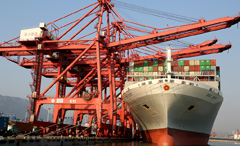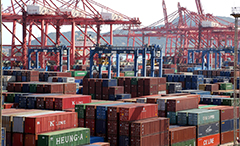World Bank ‘very impressed’ with China’s efforts to boost foreign trade
2018-10-24
Xinhua
BEIJING — Amid rising global trade tensions and domestic economic rebalancing, the World Bank assesses the evolution of China’s foreign trade positively, and is “very impressed” with China’s efforts to boost foreign trade, a World Bank economist has said.
China’s foreign trade rose 9.9 percent year-on-year to 22.28 trillion yuan (about $3.2 trillion) during the January-September period. Exports increased 6.5 percent in the period while imports grew 14.1 percent, resulting in a trade surplus of 1.44 trillion yuan, which narrowed by 28.3 percent.
“We do not see that as an imbalance,” John Litwack, World Bank lead economist for China, told Xinhua in a recent interview, referring to the export and import growth rates. “We think that it is quite normal at this point in time.”
The rapid export-led growth of the past relied on China occupying an increasingly larger share of world exports, he said. “In the current period of rebalancing and world trade tensions, this is likely no longer feasible for political as well as economic reasons.”
Noting that a steady weakening of China’s trade balance as “a natural part” of the rebalancing process, the economist said: “We don’t think that a shrinking trade balance is something for China to worry about right now.”
A weaker trade balance can even be helpful in preventing the value of the renminbi from becoming too strong and thereby hurting the competitiveness of domestic producers, he added.
Meanwhile, Litwack cautioned China of rising global trade tensions, saying “the current world political situation cannot be ignored.”
In his view, multilateral and bilateral trade negotiations will be “extremely important.”
“There is a growing feeling in many of China’s important trading partners that the time has come to move closer toward reciprocity in trade policies,” he said, adding that the World Bank hopes that China will be able to reach important agreements in this area that can sustain more openness and economic integration.
“Rising protectionism in the world is a threat, and not only to China,” he said.
Litwack acknowledged that China has been committed to boosting foreign trade. Most recently, the Chinese government released fresh rules to facilitate refunds to exporters.
“We support this effort very much. So far, we are very impressed with these efforts,” he said, adding the bank has also been working with China to reduce administrative costs to businesses.
Looking forward at the prospects for China’s foreign trade, Litwack said while China can no longer expect to expand the quantity of its exports faster than growth in the global demand for imports, it can still make progress toward improvements in the composition of its exports.
“This process is underway and we hope that it continues,” he said. “We assess the evolution of foreign trade in China positively.”


